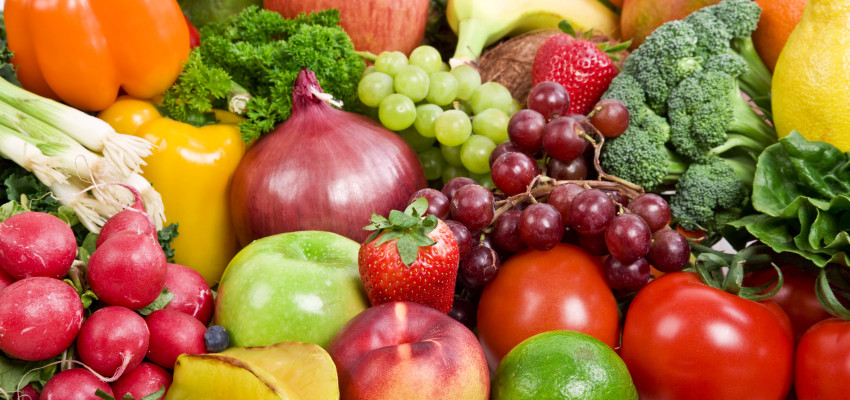By Sheridan Wimmer on May 10, 2018
Put Your Produce in its Place
Where should fruits and veggies lie?

In a scene from a popular movie, the leader of a high-school clique bluntly says, “You can’t sit with us,” when someone tries to join their lunch table without wearing the pre-approved clothing choices of the group. While rude as humans, it’s important for some fruits and vegetables to be “cliquish” and sit in an appropriate place, depending on their unique attributes.
“Storing produce accurately can save you money and can lengthen the duration the produce stays fresh,” Karen Hanson, dietitian for the Johnson County Department of Health and Environment, says.
Just the Ripe Amount
Some fruits and vegetables put off a barely detectable chemical called ethylene as they ripen. Too much of this gas leads to a loss of chlorophyll, causing your lettuce and greens to turn that nasty yellow or brown color. No one wants to eat yellow or brown lettuce.
“Fruits and vegetables give off differing amounts of ethylene gas,” Hanson says. “Some fruits ripen fast, while others take longer. It’s also a matter of which fruits and vegetables can be stored together, and which should be separated so the ethylene gas doesn’t cause over-ripening.”
To keep track of how to properly store fruits and veggies, cut out the infographic on the next page and place it somewhere in your kitchen or pantry for easy access.
Brrr, It’s Cold in Here
Temperature is another factor to consider when storing fresh produce. Store fruits like apples, apricots, Asian pears, berries, cherries and cut fruit in the refrigerator. Vegetables like artichokes, asparagus, green beans, beets, broccoli, Brussels sprouts and carrots should also be in the fridge. Avocados, kiwi, nectarines, peaches, pears, plums and plumcots should be ripened on the counter, then refrigerated.
“Store fruits and vegetables separately in a paper or perforated plastic bag,” Hanson suggests. “If you want to ripen fruit faster, put an apple with it — or another one of those ethylene-emitting fruits featured in the infographic. Check the fruit daily to make sure it doesn’t over-ripen for your taste.”
Fruits and vegetables that can be stored on the countertop include apples (fewer than seven days), bananas, citrus fruits, mangoes, melons, pineapple, basil, cucumber, onions, peppers and tomatoes.
The FIFO Rule
FIFO, or First In, First Out, is a well-known rule we all probably utilize already.
“Use whatever is oldest first and continually rotate your fruits and vegetables to ensure fresh flavor and safety and to reduce spoilage and waste,” Hanson says. “The FIFO rule applies to all types of fruits and vegetables, whether they’re fresh, frozen, canned or dried.”
Put it All Together
“It can be hard sometimes to keep proper storage of produce straight,” Hanson says. “A tip I like is to print out some handy infographics and put them on the inside of cabinets.
“A good way of thinking about it is to use fresh produce within a few days, use frozen items within six months, store canned items at room temperature and store dried produce in a cool, dark place. Always check the “use by” dates on all food items, wash fruits and vegetables prior to eating or including in any recipe and get your USDA-recommended servings of fruit and vegetables each day.”
To see recommended serving sizes, visit www.choosemyplate.gov.
| Store Alone | Store Together | Store Anywhere |
|
These fruits and veggies produce large amounts of ethylene gas and are susceptible to over-ripening. Store separately from other produce. |
While they don’t make as much ethylene gas, these fruits and veggies are still susceptible to it. They can be stored together, but not with fast-ripening produce. |
Ethylene gas has little effect on these produce items, so they can be stored safely next to other fruits and veggies. |
|
|
|


